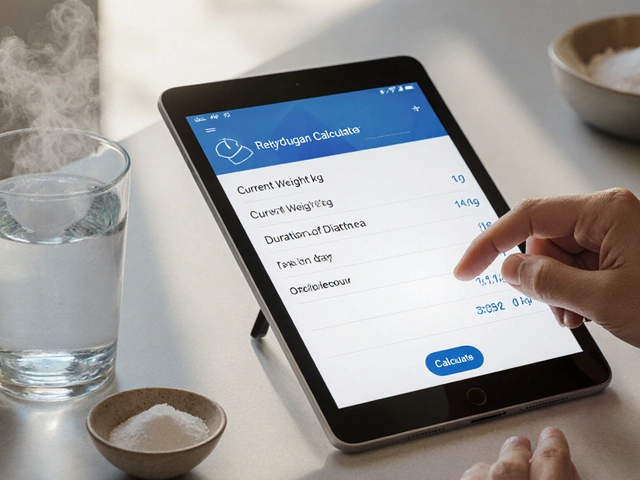
Motion Sickness & Vertigo Medication Selector
Select Your Situation
Reason:
Antivert (Meclizine) is a first‑generation antihistamine that relieves motion‑induced nausea, vomiting, and the dizziness of peripheral vertigo, typically taken as a 25mg oral tablet. While it’s a go‑to for many on cruises or long drives, a handful of other compounds compete for the same niche. This guide breaks down the chemistry, real‑world performance, and safety profile of Antivert and its top rivals so you can pick the right pill (or plant) for your situation.
Key Takeaways
- Antivert works by blocking H1 histamine receptors and has a relatively gentle sedation profile.
- Diphenhydramine and dimenhydrinate are stronger sedatives but hit the same receptors faster.
- Scopolamine offers long‑lasting protection for motion sickness but brings anticholinergic side effects.
- Betahistine and cinnarizine target inner‑ear blood flow, making them better for chronic vertigo.
- Ginger provides a non‑drug option with modest efficacy and minimal side effects.
How Antivert (Meclizine) Works
Meclizine blocks H1 histamine receptors in the vestibular nuclei of the brain, dampening the signal that tells you you’re spinning. It also has mild anticholinergic activity, which helps curb the nausea center. The drug reaches peak plasma levels in about one hour, and its half‑life (6‑8hours) means a single dose often covers an entire travel day.
Because it’s less lipophilic than some older antihistamines, meclizine tends to cause less drowsiness, though sleepy‑ness can still appear, especially at higher doses or in older adults.
Major Alternatives - Quick Overview
Diphenhydramine is a first‑generation antihistamine best known as the active ingredient in Benadryl. It’s highly sedating, with an onset of 15‑30minutes and a duration of 4‑6hours.
Dimenhydrinate combines diphenhydramine with 8‑chlorotheophylline to offset drowsiness. It’s commonly sold as Dramamine and works within 30minutes for up to 8hours.
Promethazine belongs to the phenothiazine class. It’s both an antihistamine and anti‑emetic, often prescribed for severe nausea. Onset is 30‑60minutes, lasting 6‑12hours.
Scopolamine is a muscarinic antagonist delivered via a transdermal patch. The patch provides continuous protection for up to 72hours, making it ideal for long cruises.
Betahistine is a histamine‑like drug that improves microcirculation in the inner ear. It’s taken twice daily and is most useful for Ménière’s disease‑related vertigo.
Cinnarizine is a calcium‑channel blocker that reduces vestibular hyper‑excitability. It’s often prescribed for chronic vestibular disorders and works over several days of consistent dosing.
Ginger (Zingiber officinale) is a culinary spice with anti‑emetic properties. Standardized extracts (250mg) taken before travel can cut motion‑sickness severity by about 30%.
Side‑by‑Side Comparison Table
| Drug | Class | Typical Dose | Onset | Duration | Common Side Effects | Best For |
|---|---|---|---|---|---|---|
| Meclizine | Antihistamine (H1 block) | 25mg PO once | ~60min | 6‑8h | Mild drowsiness, dry mouth | Short‑term travel, occasional vertigo |
| Diphenhydramine | Antihistamine (H1 block) | 25‑50mg PO q6h PRN | 15‑30min | 4‑6h | Heavy sedation, anticholinergic effects | Severe nausea, night‑time motion sickness |
| Dimenhydrinate | Antihistamine + stimulant | 50‑100mg PO q8h PRN | 30min | 6‑8h | Somnolence, headache | Travel where alertness is needed |
| Promethazine | Phenothiazine antihistamine | 25mg PO q6‑8h PRN | 30‑60min | 6‑12h | Drowsiness, extrapyramidal symptoms | Severe chemotherapy‑induced nausea |
| Scopolamine | Anticholinergic (muscarinic blocker) | 1.5mg patch q72h | ~4h (patch activation) | Up to 72h | Dry mouth, blurred vision, confusion | Long cruises, flight legs >8h |
| Betahistine | Histamine‑like vasodilator | 16mg PO BID | 2‑3h | 12‑24h (steady‑state) | Headache, mild GI upset | Chronic vertigo, Ménière’s disease |
| Cinnarizine | Calcium‑channel blocker | 25mg PO TID | 4‑6h | 12‑24h (after loading) | Weight gain, sedation (rare) | Persistent vestibular disorders |
| Ginger (250mg extract) | Herbal anti‑emetic | 1‑2 capsules 30min before travel | 30‑45min | ~2‑3h | Heartburn, mild diarrhea | Mild‑to‑moderate motion sickness, pregnancy‑safe |

Factors to Weigh When Choosing a Remedy
Efficacy vs. Sedation: If you need to stay alert (e.g., driving a boat), dimenhydrinate or a low‑dose scopolamine patch may beat meclizine’s milder sedation profile. For occasional vertigo where you can sit still, meclizine’s balance of efficacy and low drowsiness is attractive.
Duration of Travel: A single 25mg meclizine tablet covers a typical 8‑hour trip. For multi‑day cruises, the scopolamine patch eliminates the need to remember doses.
Age & Comorbidities: Elderly patients are more prone to anticholinergic confusion; here betahistine or cinnarizine (which lack strong central anticholinergic action) are safer. Pregnant travelers often prefer ginger due to its CategoryA safety record.
Drug Interactions: Meclizine, diphenhydramine, and other antihistamines can amplify the sedative effects of alcohol, opioids, or benzodiazepines. Scopolamine should be avoided with other anticholinergics (e.g., urinary antispasmodics) to prevent excessive dryness and blurred vision.
Safety, Contra‑indications, and Monitoring
All the drugs listed share common warnings: avoid operating heavy machinery until you know how you react. Specific red flags include:
- Meclizine: Contra‑indicated in severe hepatic impairment; caution in glaucoma.
- Diphenhydramine / Dimenhydrinate: Not for patients with narrow‑angle glaucoma or severe urinary retention.
- Promethazine: Avoid in children under two years due to risk of respiratory depression.
- Scopolamine: Contra‑indicated in untreated narrow‑angle glaucoma, severe constipation, and myasthenia gravis.
- Betahistine & Cinnarizine: Use cautiously in patients with coronary artery disease.
- Ginger: High doses may affect platelet aggregation; watch if you’re on anticoagulants.
Monitoring liver enzymes for meclizine and betahistine is prudent if you have chronic liver disease. For scopolamine patches, inspect the skin regularly for irritation.
Non‑Drug Strategies That Pair Well With Medications
Even the best drug can’t replace good motion‑prevention habits. Combine any of the above with these simple tactics:
- Face forward and focus on a stable point on the horizon.
- Stay hydrated but avoid heavy meals close to travel.
- Limit alcohol and caffeine, which can worsen nausea.
- Consider vestibular rehabilitation exercises if you suffer frequent vertigo (balance training, gaze stabilization).
These lifestyle tweaks often reduce the necessary drug dose, lowering side‑effect risk.
Quick Reference Checklist
- Need fast onset (<30min) and don’t mind sleepiness? Diphenhydramine or Dimenhydrinate.
- Prefer minimal drowsiness for a day‑long trip? Meclizine.
- Traveling >48hours and want hands‑free protection? Scopolamine patch.
- Chronic vertigo (Ménière’s) without heavy sedation? Betahistine or Cinnarizine.
- Pregnant or breastfeeding and want a natural option? Ginger extract.
Frequently Asked Questions
How long does Antivert (meclizine) stay effective?
A single 25mg tablet usually provides relief for 6‑8hours, covering most day‑long trips. Some people may need a second dose after 12hours, but doctors often advise against taking more than 50mg in 24hours.
Can I mix meclizine with alcohol?
Mixing is not recommended. Both meclizine and alcohol depress the central nervous system, which can amplify drowsiness, impair coordination, and increase the risk of falls-especially in older adults.
Is scopolamine better than meclizine for cruise ships?
For multi‑day voyages, the scopolamine patch often wins because it delivers steady drug levels for up to 72hours without the need to remember doses. However, it can cause dry mouth and blurred vision, so users who are sensitive to anticholinergic side effects may still prefer meclizine.
Can ginger replace prescription meds for motion sickness?
Ginger can lessen mild‑to‑moderate symptoms in many people, but it rarely matches the potency of antihistamines for severe nausea. It’s a safe adjunct or alternative for those who can’t tolerate sedating drugs.
What should I avoid while taking betahistine?
Avoid high‑dose caffeine and nicotine, which can counteract betahistine’s vasodilatory effect. Also, discuss any antidepressants or antihypertensives with your doctor, as drug‑drug interactions are possible.
Write a comment
Your email address will not be published.





14 Comments
Ah, the age‑old dilemma of picking a pill that stops you from feeling like a drunken sailor while you’re simply trying to enjoy the sea breeze. One could argue that the hunt for the perfect anti‑vertigo drug mirrors life’s quest for equilibrium-choose a remedy, stay steady, and hope you don’t drift into oblivion. Meclizine may whisper “mild drowsiness,” but that’s just the universe reminding you to take a nap after a long day of contemplation. If you’re looking for something that won’t knock you out like a nightcap, consider the low‑sedation options and let optimism be your compass.
Travelers often find themselves torn between staying sharp and staying steady, so you might want a medication that doesn’t fog the mind like a watercolor painting in rain. Dimenhydrinate offers a pleasant middle ground-quick enough to kick in before the boat rocks, yet gentle enough to keep the brain colorful and clear. Of course, the scopolamine patch is the marathon runner of the bunch, lasting up to three days without a reminder dose. Whatever you pick, remember the journey is as much about attitude as it is about pharmacology.
Indeed, the balance between efficacy and drowsiness is a delicate dance, and, as you rightly noted, the timing of onset plays a crucial role; meclazine, with its roughly one‑hour peak, provides a steady hand for most day‑long trips, whereas diphenhydramine swoops in faster, albeit with a heavier sedation profile. Moreover, it’s worth highlighting that the inner‑ear‑targeting agents, such as betahistine and cinnarizine, shift the focus from mere symptom suppression to vascular modulation; this distinction can be pivotal for chronic vertigo sufferers. Lastly, when considering safety, always cross‑reference contraindications-glaucoma, hepatic impairment, and anticholinergic burdens are not trivial concerns. By aligning these factors with personal health contexts, one can craft a truly personalized motion‑sickness strategy.
Use dimenhydrinate when you need alertness; it’s less sedating than benadryl and works for about eight hours.
Choosing a motion‑sickness pill is akin to selecting a philosophical doctrine for navigating the tumultuous sea of existence.
One might begin with the naive optimism that a single tablet will magically quell both nausea and the existential dread of endless horizons.
Yet, the pharmacology of meclizine tells a story of H1 blockade, modest anticholinergic whispers, and a half‑life that drifts lazily through the afternoon.
By contrast, diphenhydramine bursts onto the stage like a flamboyant philosopher shouting, “Awaken! Feel the sedation!” only to leave you in a fog of subconscious reverie.
The scopolamine patch, obediently releasing its muscarinic antagonist over seventy‑two hours, resembles a stoic monk, unwavering and mildly inconvenient due to dry mouth.
Meanwhile, betahistine and cinnarizine, with their subtle vasodilatory and calcium‑channel modulating effects, argue that the inner ear is not merely a vestibular organ but a micro‑cosm of vascular poetry.
Ginger, the humble root, saunters in as the pragmatic existentialist, refusing to dominate the narrative yet offering a modest reduction in nausea without the baggage of sedation.
One cannot ignore the sociocultural backdrop: elderly patients often get labeled as “confused,” yet the very anticholinergic load of many antihistamines may be the true culprit.
Pregnant travelers, meanwhile, are nudged toward ginger not because it’s a placebo but because its safety profile aligns with the doctrine of “do no harm.”
The trade‑off between onset speed and duration becomes a metaphor for life’s own pace-quick fixes versus sustained commitment.
If your voyage spans multiple days, the patch’s constant presence is like a silent mentor, whereas a single meclizine tablet is the fleeting advice of a passing stranger.
Sedation preferences also map onto personality traits; those craving alertness may gravitate toward dimenhydrinate, while the “I’ll nap later” crowd embraces the heavy‑handed benadryl.
Drug interactions, of course, are the inevitable entanglements of any social contract; alcohol, opioids, and benzodiazepines will amplify the drowsy chorus.
Ultimately, the decision matrix is less about the chemicals and more about the traveler’s self‑knowledge, health landscape, and willingness to tolerate side effects.
So, before you pop a pill, ask yourself whether you desire a temporary escape or a long‑term partnership with your vestibular system.
In the end, the best remedy may be a blend of pharmacology, proper hydration, and the simple act of focusing on a steady point on the horizon-an elegant synthesis of science and stoicism.
Well, if philosophy were a pill, we’d all be overdosing on meclizine by now, wouldn’t we? 😉 Your epic saga reminds me why scopolamine patches exist-so we don’t have to write dissertations every time we board a ferry. Still, I’ll take the colorful route and suggest a low‑dose diphenhydramine for those who enjoy a quick‑fire punch of calm, mixed with a dash of humor. Keep the sarcasm flowing, it’s the best anti‑nausea for the soul.
Let me set the record straight: the whole meclizine versus benadryl debate is overblown and only for those who cant read a label. Those who think a patch is a fashion accessory clearly havent tried real therapy. The real answer lies in personalized dosing, not in generic hype. Stop feeding the market with careless marketing fluff.
I guess nausea is just my body’s way of saying it’s over‑prepared for adventure.
It is morally reprehensible to promote any drug that induces drowsiness without first warning the user about the peril of impaired judgment. People who casually recommend benadryl for a night flight are essentially encouraging reckless endangerment. The pharmaceutical industry thrives on such negligence, and we must call them out for prioritizing profit over safety. Choose wisely, and demand transparency from manufacturers.
While the prevailing consensus extols meclizine as the optimal compromise between efficacy and sedation, I must dissent on methodological grounds. The comparative trials frequently neglect the subtle yet consequential anticholinergic burdens that accrue in polypharmacy contexts. Moreover, the extrapolation of short‑term tolerability data to chronic vertigo populations may be scientifically untenable. Hence, a more rigorous, longitudinal assessment is requisite before endorsing any singular agent.
Great points! If you’re leaning toward the patch for multi‑day cruises, remember to rotate its placement to avoid skin irritation. For those who prefer a quick kick, dimenhydrinate’s blend of diphenhydramine and caffeine offers a balanced approach. And never underestimate the power of simple hacks-like focusing on the horizon or staying hydrated-to amplify the medication’s benefits. Stay safe and enjoy the voyage!
hey folks, just a heads‑up that ginger can be a real game‑changer for mild nausea – no crazy drowsy side‑effects 😎. pop a couple of capsules before you board and you’ll probably forget the sea ever tried to toss you around.
Indeed, when considering betahistine for chronic vertigo, it’s prudent to monitor blood pressure, especially in patients with underlying cardiac concerns. Likewise, cinnarizine’s loading phase may require a few days before noticeable improvement, so patience is key. Pairing these agents with vestibular rehabilitation exercises often yields synergistic results, enhancing overall stability.
Medication choice is a subtle art that balances chemical action with personal tolerance. Meclizine offers a gentle antihistamine effect that lasts through a typical travel day. Diphenhydramine delivers a rapid onset but at the cost of heavy sedation. Dimenhydrinate adds a stimulant to offset drowsiness while still blocking histamine receptors. Scopolamine patches provide continuous protection for up to seventy two hours without the need for repeated dosing. Betahistine works by improving inner ear blood flow and is useful for chronic vertigo. Cinnarizine reduces vestibular hyperexcitability through calcium channel blockade. Ginger represents a natural alternative with modest anti‑emetic properties and minimal side effects. The sedative profile of each drug should match the activity level required during travel. Elderly patients should avoid high anticholinergic loads to prevent confusion. Pregnant travelers need to consider safety categories and often prefer ginger. Drug interactions with alcohol or CNS depressants can amplify drowsiness and must be monitored. Understanding onset time helps plan dosing schedules around travel itineraries. Duration of protection influences whether a single tablet or a patch is more convenient. Lifestyle measures such as focusing on the horizon and staying hydrated complement pharmacotherapy. Ultimately the optimal regimen emerges from weighing efficacy, side effects, duration, and individual health status.